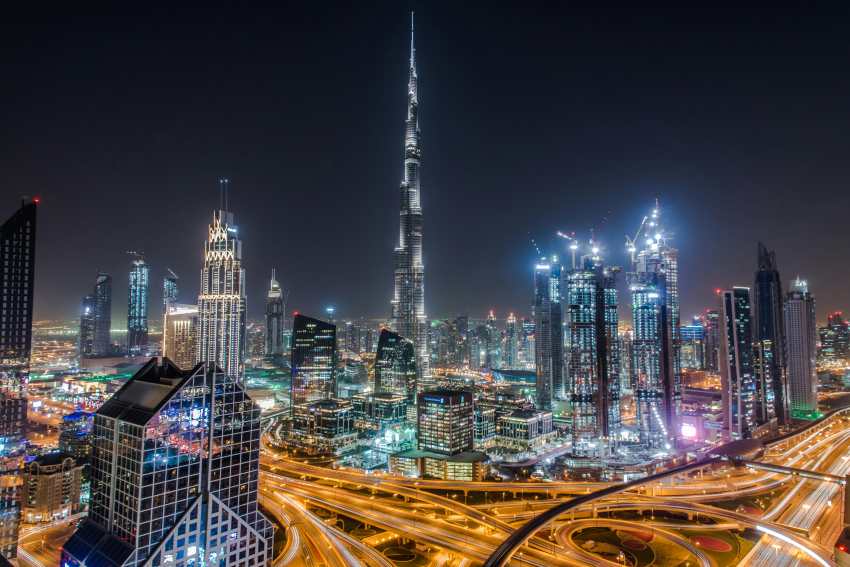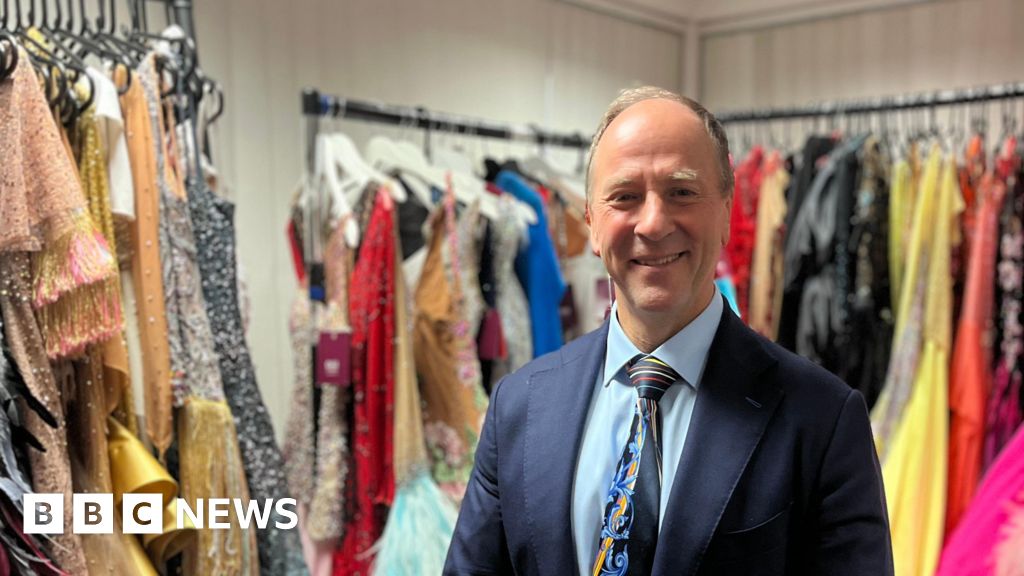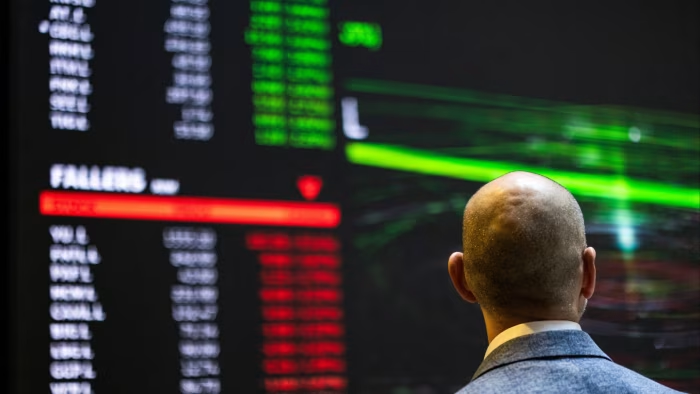Jonathan MorrisSouth West
 Aidan Monaghan/HBO
Aidan Monaghan/HBOAn organisation supporting film productions in Devon is on a mission to map out the county’s most film-worthy…

Jonathan MorrisSouth West
 Aidan Monaghan/HBO
Aidan Monaghan/HBOAn organisation supporting film productions in Devon is on a mission to map out the county’s most film-worthy…

Pinterest unveiled new user controls for generative AI content on October 16, 2025, marking a shift toward transparency in how platforms handle artificial intelligence-generated imagery. The visual discovery platform announced tools that…


Catherine, the future Queen, penned a…

Published on
October 18, 2025
As part of its dedication to influencing the direction of innovation, technology, and artificial intelligence, Dubai is getting ready to host a remarkable international event in December 2026. One of the biggest technology and innovation conferences in the world is expected to be Gitex TechCation 2026. The event, which is set for December 7–11, 2026, at the recognisable Expo City Dubai, will firmly establish the emirate as a world leader in technological innovation.
In an unprecedented move, Gitex TechCation will not only focus on traditional technology exhibitions but will extend across the entire city of Dubai. The event will seamlessly integrate digital creativity with leisure, culture, and entertainment, transforming Dubai into a citywide stage for innovation.
Announced by Sheikh Hamdan bin Mohammed bin Rashid Al Maktoum, Crown Prince of Dubai and Deputy Prime Minister of the UAE, this event has been designed to reflect the ambitious directives laid out by His Highness Sheikh Mohammed bin Rashid Al Maktoum, the Vice President and Prime Minister of the UAE. The collaboration aims to create an immersive experience for visitors and participants, marking Dubai as the premier global destination for cutting-edge technology and futuristic solutions.
The Dubai World Trade Centre (DWTC) and the Dubai Department of Economy and Tourism (DET) have formed a strategic partnership to organise and promote the event. The collaboration will highlight Dubai’s cultural and tourism assets, presenting a series of TechCation-themed programmes, campaigns, and experiences across the city. These initiatives will integrate technological advancements with art, leisure, and entertainment, appealing to both tech enthusiasts and travellers seeking immersive experiences.
This collaboration also aligns with the Dubai Economic Agenda (D33), a visionary plan to elevate Dubai’s global status by placing it among the world’s top three cities by 2033. Through the event, Dubai seeks to position itself as a hub for talent, innovation, and investment, driving its economic growth and attracting visitors from around the globe.
Gitex TechCation serves as a catalyst for tourism growth, with Dubai’s status as a top-tier global travel destination offering a significant backdrop to the event. Having been ranked No. 1 globally in Tripadvisor’s Travellers’ Choice Best of the Best Awards for three consecutive years (2022–2024), Dubai’s reputation as a leading tourism destination is well established. Hosting an event of this scale will only serve to enhance its stature on the global stage, attracting tech professionals, entrepreneurs, investors, and tourists alike.
Dubai’s commitment to blending tourism with technology is further exemplified by its rising prominence in the culinary world. The Michelin Guide for 2025 recognised 119 restaurants in Dubai, including 19 Michelin-starred establishments, further bolstering the city’s reputation as a gastronomic haven. Moreover, two Dubai restaurants have secured places among The World’s 50 Best Restaurants 2025, solidifying the city’s position as a global leader in both technology and luxury tourism.
Gitex TechCation 2026 is not just a celebration of technological advancements but also a vital step toward realising Dubai’s D33 Vision. This initiative underscores the importance of integrating the technology sector with the city’s thriving tourism and cultural ecosystem. Through this event, Dubai seeks to further expand its digital and cultural landscape, driving sustainable economic growth while attracting talent, businesses, and investors to the emirate.
Dubai’s role as a leader in attracting Foreign Direct Investment (FDI) is evident from its recent achievements. The city was ranked first in Greenfield project inflows for the eighth consecutive half-year period in 2025, highlighting its appeal to international investors. Additionally, Dubai topped Savills’ Executive Nomad Index, a ranking that underscores the city’s growing appeal to digital entrepreneurs and global professionals.
This continuous growth and development have firmly established Dubai as a global centre for business and technology, with Gitex TechCation acting as a key driver of the city’s expansion as a world leader in tech, innovation, and sustainable investment.
By hosting Gitex TechCation, Dubai not only showcases its technological prowess but also its commitment to creating a unique, multi-faceted destination for both leisure and business travellers. As the city increasingly becomes a place where cutting-edge technology and rich cultural experiences intersect, Dubai offers an unparalleled destination for travellers looking to engage with the future of innovation.
From stunning skyscrapers to futuristic museums, Dubai’s skyline reflects its forward-thinking ethos. The city’s investment in advanced technologies, sustainable practices, and cultural integration makes it the perfect host for a mega event like Gitex TechCation. As Dubai continues to expand its tech ecosystem, the emirate remains a beacon for global travellers and tech enthusiasts seeking to explore the intersection of digital transformation and tourism.
Dubai will keep pushing the limits of what is feasible in terms of both tourism and technology with the upcoming Gitex TechCation. Dubai’s strong infrastructure and forward-thinking outlook guarantee that the city will continue to lead the way in innovation. In addition to showcasing the newest technological developments, the event will show how technology can be easily incorporated into daily life, improving the overall experience of guests.
An important milestone in Dubai’s history, Gitex TechCation 2026 will help the city achieve its vision of becoming a global centre for innovation, tourism, and technology. Dubai is undoubtedly establishing itself as the go-to place for tech enthusiasts, innovators, and tourists from all over the world as the countdown to this historic occasion draws near.


Kristen Bell shared an amusing moment during a recent interview that quickly caught fans’ attention.
While speaking about her latest projects with…

 BBC / Gem O’Reilly
BBC / Gem O’ReillyThe glitz and glamour of the Strictly ballroom or the Emerald City in Wicked seem like a world away from a south London trading estate.
Continue Reading

Early detection is “key” when it comes to diagnosing and treating breast cancer, an Isle of Man charity has said, with the likelihood of complications increasing “the longer you leave it”.
October marks Breast Cancer Awareness month, an…

Unlock the Editor’s Digest for free
Roula Khalaf, Editor of the FT, selects her favourite stories in this weekly newsletter.
Questions over the colossal investment by US tech companies in artificial intelligence, now running at $400bn a year, continue to come thick and fast.
Will it, sceptics ask, ever be recouped, let alone generate the magical returns AI zealots expect? Leaders of the financial world from Kristalina Georgieva, IMF managing director, to Jamie Dimon of JPMorgan Chase have warned of an abrupt market correction. Could this be one of history’s more extreme cases of irrational exuberance?
That phrase, you may recall, was coined by Fed chair Alan Greenspan at the start of the dotcom bubble. He later backtracked, declaring that bubbles could only be detected after the event. The revisionist Greenspan view overlooked that in any bubble there are always shrewd people who see what is coming. For example, on the eve of the 1929 Wall Street crash statistician Roger Babson warned that a “terrific” crash was imminent. More recently Jeremy Grantham, co-founder of US fund manager GMO, famously predicted the bursting of the great Japanese bubble, the dotcom bust and the 2007-08 financial crisis. In the UK fund manager and philanthropist Jonathan Ruffer earned strong returns for his clients around the dotcom blow-up, the great financial crisis and the Covid market plunge. Yet such contrarian voices are always drowned out by those who claim that “this time is different”.
Whether today’s stock market valuations are irrational is a matter of judgment. But whether investors are behaving irrationally is a different issue. Clearly in all market manias going back to the South Sea Bubble, punters have been intoxicated by stories of untold riches and driven by the fear of missing out (Fomo). Fomo falls short of exuberance but is not exactly irrational. More importantly, in the 21st century when professional investors dominate markets, a paradoxical and perverse rationality is at work among them.
This arises because large amounts of money are delegated by asset owners such as pension funds to asset managers. The job of active managers has traditionally been to maximise returns by assessing fundamental values arising from long-term corporate cash flows. Yet there is a principal-agent problem here. To monitor the managers, asset owners usually benchmark them against an index.
So where managers have a below-index weight in stocks that are rising strongly this puts pressure on them to adopt momentum, or trend following, strategies to improve short-term performance. They thus become late-stage buyers of rising stocks and sellers of falling stocks at the cost of longer-term underperformance. This helps reduce the risk of their being fired, or at least of being fired sooner rather than later.
Research by Paul Woolley and Dimitri Vayanos of the London School of Economics suggests that such momentum trading helps explain the poor performance of active managers and is conducive to a persistent bias to overvaluation. Passive investing, now all-pervasive, is momentum writ large. As well as amplifying mispricing it reduces the liquidity of individual stocks and increases their volatility. Misallocation of capital results, especially where companies use overpriced equity to make acquisitions that encourage industrial and portfolio concentration.
AI brings a further twist to these market dynamics. The Bank of England worries that the use of advanced AI-based trading strategies could lead to firms taking increasingly correlated positions, thereby amplifying shocks. Yet the technology could also hold a key to addressing the resulting instabilities.
Woolley and Vayanos have teamed up with AI experts at Oxford university under Sir Nigel Shadbolt to develop new forms of portfolio analysis designed to disaggregate momentum from fundamental values. This has involved running synthetic portfolios using real price data for periods of up to 30 years.
Initial results reveal managers’ skill (or lack of skill) in establishing fundamental value as opposed to their luck in using momentum. In effect, the methodology unpicks the principal-agent conflict. And because this AI diagnostic process provides aggregate data showing how far the market is dominated by momentum, it should help identify bubbles.
The potential here for a big leap in the quality of performance attribution could clearly be valuable for asset owners. But it can never eliminate bubbles. The innate tendency of investors towards exuberance and the corporate compulsion towards leverage will together periodically defy the wisdom of the ages. The snag for shrewd naysayers in any bubble is that the timing of the burst is next to unforecastable.
john.plender@ft.com